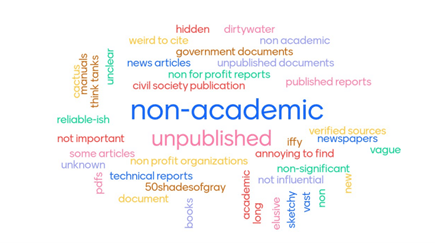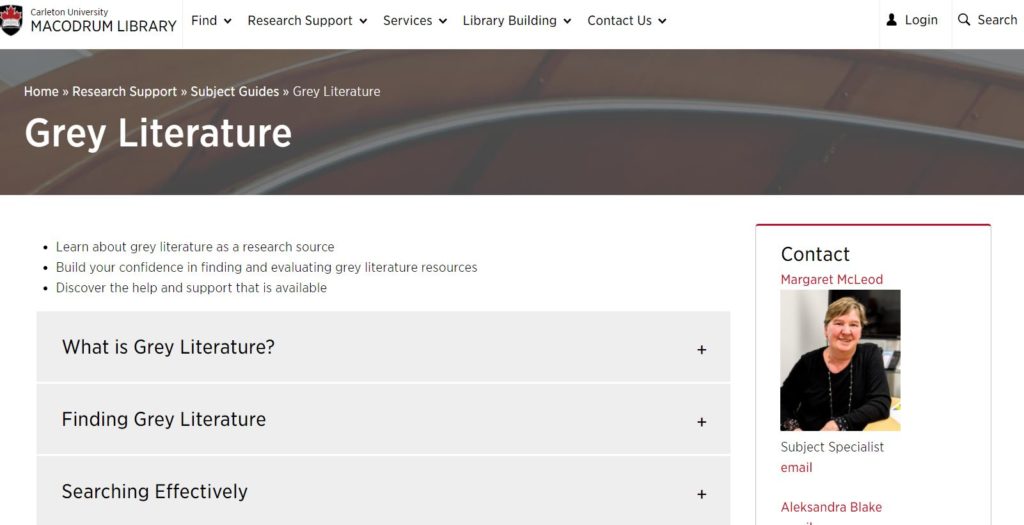Learn about the benefits of constructing a multi-year internship from a MLIS student's perspective.

Grey is the new black: Changing library instruction virtually
By Aleksandra Blake and Margaret McLeod
While graduate students are well versed in searching for traditional academic literature (e.g., monographs and peer reviewed journal articles), they might be a bit “out of their league” in their ability to find grey literature (e.g., literature published outside of the mainstream academic and commercial publishing sectors). However, grey should be their new black— for example, many masters and doctoral students need to be equally capable of finding the material published by a wide range of researchers if they are to graduate with a robust set of professional skills that can be used in a variety of workplace contexts.
Our experience in designing and delivering a grey lit workshop tells us that our instincts are good—students are eager to learn these skills and put them to use in either a face-to-face or a virtual classroom.
What is grey lit and why is it the new black?
Searching for grey literature (“grey lit”) is an important part of conducting systematic, scoping, or other comprehensive literature reviews in many disciplines. Access to grey literature allows researchers to find alternative perspectives that may not be represented in standard literature and locate experts in a particular field. In addition, grey lit offers the potential to balance any tendencies for bias found in mainstream published literature. Publications that can be defined as grey lit (for example:government documents, conference papers, clinical trials and technical reports, etc.) are timely, rapidly produced, and very current, offering an alternative to traditional academic peer reviewed sources. However, searching for grey literature can often be a tricky and overwhelming process in part because this topic is not always integrated into standard information literacy teaching sessions in post-secondary libraries as it should be.

Not all university graduates will be working in academia. Many will find work in places like government or at NGOs, among others, and searching for grey literature may become valuable and transferable skills in their professions. Our new workshop Grey is the new black. Grey literature: how to find it? is designed to prepare grad students to find “grey” research, for both their academic and professional work.
At Carleton University, graduate students have the opportunity to participate in professional skills workshops. These workshops are offered as part of the Grad Navigate professional development initiative and include topics such as presentation skills, networking skills, and formatting a thesis or dissertation using Microsoft Word. Our workshop provides students with a greater understanding of how grey literature is defined, the benefits of searching it, and links to a number of useful sites providing access to resources relevant to students in different fields.
As subject specialists in the Carleton University Library, we both are responsible for subject specialties in the social sciences. We decided to design and deliver this presentation because we recognize that, more and more, students are being required to find the “non-mainstream” research and are frustrated by this search process because they are unsure about how to locate research that might not show up in a traditional academic database or discovery layer search. For example, social work, international affairs, and political science researchers are expected to look for policies and critiques more frequently now than ever. Grey literature sources, which are very current, provide the latest information on topics not yet covered by scholarly material.
Designing face-to-face and online workshops Our online course was more interactive & multidimensional than our in-person session.
In planning this new session, we started by thinking about our individual approaches to teaching and how we could effectively combine our pedagogical methodologies. Fortunately, we found that we agree on certain fundamental principles. In particular, we both believe that the primary job of an academic library instructor is to facilitate the discovery process rather than to provide answers to all the questions. As such, we think that active learning and access to specialized software are critical to creating a productive learning environment and teaching core skills such as strategic searching and evaluation of sources. Our goal is to ensure that the participants in our sessions gain knowledge that they will be able to take with them beyond their academic education. Plus, we want them to have fun! In February 2020, we offered this course face-to-face in the main library teaching space. Eleven grad students attended the session and we received positive feedback from the participants. For the purpose of this session, we used a previously existing grey lit help guide that contained essential information related to understanding and searching for these materials. We brainstormed ideas and came up with the following learning outcomes:
- Define what grey literature is and is not
- Justify why it is important to search grey literature when conducting knowledge syntheses
- Identify key grey literature sources
- Select grey literature sources specific to a topic and begin creating a search plan
- Articulate the process involved with producing a well-documented and transparent grey literature search
Engagement was high. We offered several activities such as small group work, grey lit recognition exercises, and open discussions. Positive responses from our participants encouraged us to continue our collaboration and to improve upon what we had already accomplished.
Moving forward meant, however, that we would have to change our mode of delivery; the library building was closed as of mid-March, which meant that we would have to switch to an online delivery format if we wanted to offer the workshop in either the summer or fall terms. Initially, we started this new design phase thinking that our online workshop would be less interactive for students. However, moving from in-person to online was easier than we thought. Although teaching via an online platform such as Zoom is different from being in the library classroom, we found that our students were engaged and just as interested as those who had taken the workshop in the early winter.
Our design process began with a review of the grey lit guides already available through the library website. We recognized that the current help guide was not the optimal teaching tool for an online workshop. Instead, we decide to create a subject guide that would be the basis for structuring our workshop and sharing information with students on an ongoing basis. Our subject guides are similar to Libguides but created on the Drupal platform.
We created a subject guide for grey literature and taught the workshop using this guide because this type of online resource has greater visibility on the library website, and the layout of the guide allows for customization. We set up the guide to fit the desired Drupal-based format and organized the content based on a number of priorities:
- The information needed to match the flow of our presentation.
- The content needed to be readable online and easily discoverable by anyone who finds the guide without our support.
- The information needed to meet the needs of our users, from novice to more experienced researchers. For example, the researcher is able to explore the different sections of the guide with no need to review the content if they are already familiar with specific sections.
- The guide needed to reflects the steps that one needs to take while researching. First, they must familiarize themselves with the topic (what grey lit is and why it is relevant to explore it), then go on to the stage of searching (hence the guide, which directs users to links to databases and repositories), and finally they need to evaluate and cite information, which is the last part of the guide and our session.

We set up a Zoom session for our presentation. During the workshop, we presented the information by screen sharing the guide. Essentially, the guide was our instructional roadmap.
In order to make the presentation more interactive, we used an application called Mentimeter, which is a web-based application that supports the creation of online polls with real-time feedback. In addition, we had the group do an interactive exercise in which they identified which items were grey or not grey. We had to work hard to keep up because the Zoom chat box kept filling up with their answers and additional questions! We also set aside 15 minutes of the presentation time for more in-depth conversation by dividing participants into two breakout rooms and continuing to facilitate an open discussion. We had prepared some topics for analysis, but our participants had specific questions related to their research and we followed their lead. It was interesting to watch how the discussion developed, especially the peer-to-peer collaboration. Thirty-one participants attended our one hour online session.
Debriefing: Grey is the new black and Zooming is the new interactivity
We think that the online format made the session more interactive, and allowed the students to be more engaged with the multidimensional content than the in-person session. Participants seemed less nervous about contributing ideas online, especially through the chat feature. They were more likely to be on an equal footing than in the classroom, as everyone had a chance to respond whereas in class it might be only one or two who speak loudest and first. We applied active learning techniques by using Mentimeter to encourage engagement with the material and each other, screen sharing of documents, and online discussion rooms. All of these features allowed us to interact with students as much as possible and keep the conversation flowing.
Despite our initial apprehension, we are happy with the final product and students’ reaction to our workshop. Moving from each section of the presentation was smooth and looked seamless, so this process was much easier for us than we had anticipated. Participant feedback was positive and overall, students enjoyed “learning about Carleton’s library technology to help with grey literature”. Our next steps are to prepare to teach again in the winter term of 2021. We hope to deliver this session again in the winter term of 2021. We will review the basic structure and content of the workshop and we have already started to update the subject guide based on the comments and suggestions we have received from students as well as the constant changes in the field of grey literature.
Overall, we believe that by having to teach this workshop online, we have strengthened our teaching praxis. In particular, by being able to provide information via different media (visual and auditory), we can reach a larger audience and enrich student learning. Plus, students continue to have the opportunity to learn a skill set that they can use professionally.
Photo creadit: Chris Montgomery on Unsplash
Aleksandra Blake is a subject specialist in Research Support Services at the Carleton University Library, providing research support in areas of Political Science, International Affairs, Political Economy and European and Russian Studies. She holds a Master of Library and Information Science degree from San Jose State University, and a Bachelor’s degree in Political Science from Carleton University. Her research interests include information literacy, accessibility of government information, and qualitative research.
Margaret McLeod is a subject specialist in Research Support Services at the Carleton University Library, providing research support in areas of African studies, social work, and global and international studies. She is a Carleton History graduate with interest in information literacy, primary source research, and library teaching/instruction.


